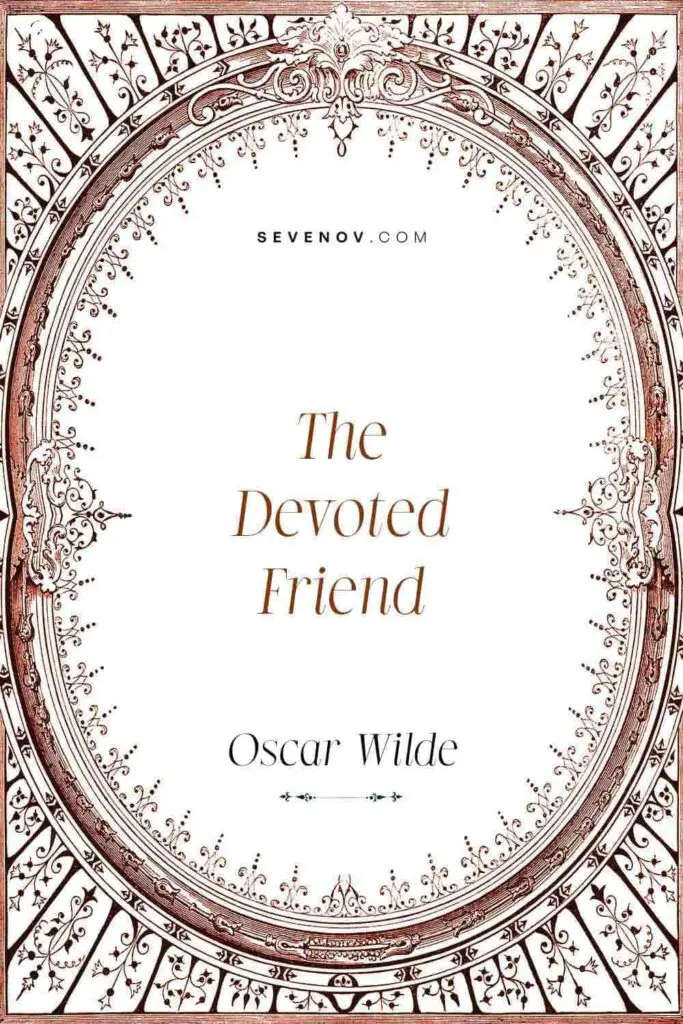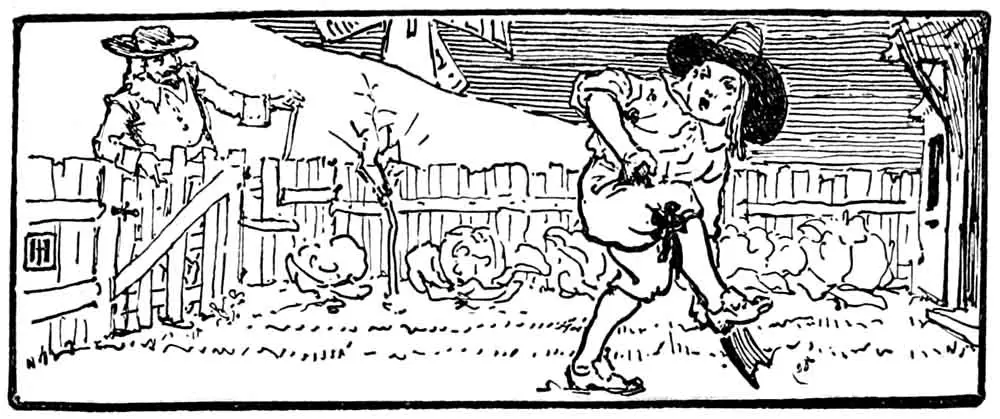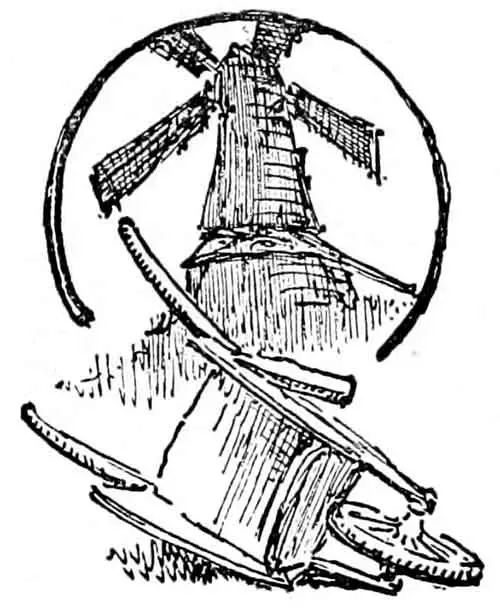
The Devoted Friend by Oscar Wilde
Author: Oscar Wilde
Published: 1888
Genre: Short Story, Satire, Tragedy
“The Devoted Friend” is a short story written by Oscar Wilde, part of his collection of short stories titled The Happy Prince and Other Tales, published in May 1888. Other short stories in this collection are “The Happy Prince,” “The Nightingale and the Rose,” “The Selfish Giant,” “The Devoted Friend,” and “The Remarkable Rocket.” Considered a story inside a story, a Linnet, a Duck, and a Water-rat gather around a pond while discussing a fable about the one-sided friendship between a poor, innocent peasant and a wealthy, self-centered tradesman.
1. The Devoted Friend Synopsis
“The Devoted Friend” begins with a Linnet, a Duck, and a Water-rat assemble around a pond. The Water-rat asserts nothing is more noble or scarce than a real friendship.
The Water-rat explains that this form of friendship is one where his companions are entirely loyal to him. The Water-rat is asked what he would do for his pals in return by the Linnet, but he cannot answer. This prompts the Linnet to craft an internal story about friendship.
The Linnet narrates the friendship between a wealthy businessman, Hugh the Miller, and a naive peasant, Hans. The Miller claims to be Hans’ devoted friend but frequently visits Hans’ garden to steal flowers. When winter arrives, the Miller chooses to stay home with his wife and son instead of seeing Hans, who is suffering terribly and selling many of his belongings to buy bread.
2. The Devoted Friend Summary
One day, an elderly water rat emerges from his burrow to observe a duck teaching her ducklings how to stand on their heads in the water. The Water-rat starts the conversation with the Duck by expressing his admiration for loyal friendship. A Linnet overhears their discussion and queries the Water-rat about the characteristics of a loyal friendship. The Water-rat, in response, says he highly expects his friend to always be loyal.
The Linnet challenges the Water-rat on what he would do in return for his supposed loyal friend. As the Water-rat pretends not to understand the subject, the Linnet shares a tale of friendship with the Water-rat.
The Linnet opens his story with the introduction of Hans, a humble peasant who lives in a small house with a lovely garden. Hans’ “most dedicated friend is Hugh, a wealthy Miller. Hans is frequently visited by The Miller, who says, “Real friends should have everything in common,” while stealing flowers from the garden.

Hans goes along with the Miller’s words. The Miller never offers Hans anything in return, which the neighbors find strange, considering his wealth. Hans, however, is unaware of this and instead finds joy in the lovely and profound words the Miller says about the selflessness of true friendship.
Winter arrives, causing Hans to be cold and hungry because he has no flowers to sell at the market. The Miller never comes to see Hans; instead, he stays warm in his house with his wife and son, eating and drinking comfortably. According to the Miller, visiting Hans is pointless since people should be left alone and not harassed by guests when they are in distress, he tells his family.
He wants to meet Hans in the spring when Hans will have flowers for the Miller to receive once more. The Miller’s wife praises her husband, telling him that he is “definitely extremely thoughtful about people” and that it is “such a delight” to listen to all the sage advice he has to offer. The Miller reprimands his son for asking after Hans and offering to share his food with the peasant, claiming that doing so would spoil Hans’ good disposition.
The Miller asserts that speaking effectively is far more difficult and “finer” than behaving well, a skill few possess. The Water-rat interrupts, asking the Linnet if that concludes the narrative. When the Linnet remarks it was only the beginning, the Water-rat scoffs, noting that it is currently fashionable to begin a story with the conclusion, move on to the beginning, and end with the middle. He knows this because he overheard a very well-to-do, spectacled man say it the other day by the pond.
Still, the Water-rat urges the Linnet to keep telling the tale. The Water-rat likes the Miller because he, like the Miller, has all kinds of great sentiments.
The Miller visits Hans when spring arrives. The Miller vigorously disputes Hans’ assertion that he forgot Han, then gives a speech about “friendship never forgets.” Hans confides to the Miller about his financial situation; he was forced to sell several items, including a wheelbarrow, to raise money for food. He must now sell flowers to recoup his possessions.
The Miller offers Hans his damaged wheelbarrow, claiming this to be an incredibly generous act, despite the wheelbarrow’s poor shape. Hans thanks him and says he has one extra plank of wood he could use to fix this wheelbarrow. The Miller takes the wood to repair his barn roof and a huge basket of flowers from Hans’ garden.
The Miller comes to Hans’ cottage the following day and requests that Hans take a sack of flour to the market for him. Hans regrettably replies that he is too preoccupied to assist, to which the Miller retorts that Han is impolite. Appalled at this accusation, Hans rushes to the market with the flour sack. The journey is exhausting, but he successfully sells the flour for a good price and makes it home.
The Miller pays Hans another early morning call. Finding Hans asleep, he accuses Hans of being indolent and asks him to fix his farm roof. Hans consents. When Hans completes the task, The Miller says the work one does for others is the most enjoyable. The next day, the Miller instructs Hans to drive his sheep up the mountain.
As a result, Hans cannot work in his garden because of the Miller’s errands. Despite this, Hans still wants to make the Miller happy.
The Miller urges Hans to get a doctor one night during a storm since the Miller’s son wounded himself after falling from a ladder. Hans begs the Miller to lend his lantern to him so that he can light the path in the pitch-black night, but the Miller declines, pointing out that it is brand-new. Han has no choice but to set off in the pitch-black night and arrives at the doctor without incident.
Unfortunately, Hans has no light to help him on the way back and becomes lost on the moor. He drowns after falling into a big trench. Some passing goatherds discover his body the following morning.
The townspeople hold a funeral once Hans’ body is returned. As the head mourner, the Miller laments that because Hans has passed away, he has no one to whom he can give his broken wheelbarrow, and he could not sell it for even pennies. The Miller comments on how people suffer from being generous, vowing never to give away anything again.
The Water-rat then inquires about what happened to the Miller, to which the Linnet replies that the Water-rat did not grasp the tale’s lesson. The Water-rat rushes back into his burrow, shocked at the existence of a moral for this particular story. A short while later, the Linnet informs the Duck that the Water-rat left after hearing him narrate a moralized fable. The Duck acknowledges that presenting a parable is usually a perilous thing to do, an opinion the narrator shares as well.

3. Characters
Hans – The protagonist of the Linnet’s tale. Believing he is the Miller’s best friend, he is an innocent, good-natured peasant living in a tiny cottage and growing flowers he sells at the market. Generous but naive, he does not realize his ‘best friend’ is taking advantage of his kindness.
Hans’s death is terrible because he neither receives praise for his kindness nor justice for the exploitation he endured at the Miller’s hands. Hans does not develop throughout the narrative and dies as innocent as he was at the story’s beginning. With Hans’ character, Wilde shows the costs of being too naive.
Hugh – As the antagonist, he is a wealthy but self-centered merchant who exploits and manipulates Hans for his gain. Throughout the story, he does not bother sharing his wealth with Hans, getting him to perform unpaid labor and freely taking his produce in the name of friendship.
While Hans suffers through the winter with very little to eat, Hugh stays in his comfortable home with his family, a pinewood fire, and plenty of food and drink. He offers Hans a broken wheelbarrow, openly applauding himself for his generosity.
The Miller’s requests grow increasingly unreasonable as the story progresses, showing no limit to how much he is willing to exploit Hans. The Miller’s last demand is for Hans to fetch the doctor for his son during a storm in the middle of the night. Despite the already preposterous nature of this request, the Miller refuses to give Hans his lantern for guidance during the storm, indirectly causing Hans’s death.
The Water-rat – The Water-rat serves as the Linnet’s audience. He seems to identify with the Miller because, like him, the Water-rat has many marvelous but skewed ideas about friendship and life.
The Duck – Along with the Water-rat, the Duck serves as the audience to the Linnet.
The Linnet – The Miller and Hans’ tale is told by the Linnet. He narrates the story to the Water-rat to illustrate the perils of one-sided friendships, but the Water-rat rejects the lesson.
4. Themes
4.1. Friendship and Innocence
Hugh the Miller, a wealthy and egotistical man, persuades Hans to do different tasks for him in the name of loving friendship.
Innocence was typically viewed as a redeeming quality throughout the Victorian era. Accordingly, Hans embodies kindness and altruism and is happy to perform various tasks and errands for his professed best friend, the Miller. He is unaware that the Miller never reciprocates.
Hans and the Miller have an incredibly one-sided friendship. The Miller keeps manipulating Hans into donating items or doing duties, and Hans, who badly wants to be a loyal friend, continues to be fooled through each ploy.
The Miller tells Hans that true friends should have everything in common at one point in the story to justify stealing so much from Hans’ garden. Hans smiles and accepts this, feeling pleased to have such an insightful friend.
When the Miller asks Hans to help carry a flour sack to the market, Hans respectfully declines, as he is too busy to assist. In response, the Miller calls Hans “unfriendly,” bringing up how he would pass his wheelbarrow to Hans.
Hans is shocked that the Miller would think him unkind, causing him to immediately depart for the market with the Millers’ flour. While the neighbors find it bizarre that the rich Miller never provided anything in exchange, Hans is blissfully unaware. He merely enjoys the simple joy of sharing with a companion, not recognizing his companion is somehow not reciprocating his efforts.
Because of Hans’ naivete, the Miller repeatedly exploits him throughout the narrative, ultimately resulting in the youngster’s tragic demise. In his work, Wilde shows how naivete can eventually be harmful to oneself and that the basis of a genuine friendship should be reciprocity.
4.2. Storytelling, Language, and Morality
When the Linnet closes its tale, The Water-rat is incensed at the concept that Hans and the Miller’s story had a moral. Although the Water-rat is unsure of what that moral was, he is nevertheless enraged at the thought of it. The Linnet worries it may have offended the Water-rat when it rushes off.
Fairytales and fables are frequently told to children since they are recognized for having some morals behind them. The story “The Devoted Friend” shows that while language and narrative can impart morality, these morals are not always correct and should not be embraced or rejected out of hand.
Wilde seems to be arguing for a different method by highlighting the risks of these two extremes: carefully considering morality and only adhering to those that one feels is correct.
4.3. Class and Exploitation
Hans is a poor villager, and the Miller is a wealthy tradesman; therefore, they have a distinct socioeconomic divide. Despite his affluence, the Miller is selfish and keeps stealing from Hans and using the poor man’s labor despite Hans having almost nothing.
Additionally, the Miller uses Hans without hesitation and gets away with it without being penalized. Wilde illustrates how the wealthy can frequently take advantage of the poor without taking responsibility for their deeds through this story of exploitation.
5. Adaptations
The cartoonist P. Craig Russell adapted the story for comics in the fourth Volume of Fairy Tales of Oscar Wilde, which also includes The Nightingale and the Rose. Maurice Joyce directed an animated made-for-television movie, Wilde Stories: The Devoted Friend. It was released in 2003.
6. Quotes from The Devoted Friend
‘And what, pray, ls your idea of the duties of a devoted friend?’ asked a green Linnet.
‘What a silly question!’ cried the Water-rat. ‘l should expect my devoted friend to be devoted to me, of course.’
‘And what would you do in return?’ said the little bird, swinging upon a silver spray, and flapping his tiny wings.
‘l don’t understand you,’ answered the Water-rat.
‘My dear friend, my best friend,’ cried little Hans, ‘you are welcome to all the flowers in my garden. I would much sooner have your good opinion than my silver buttons, any day.’
‘I am rather afraid that I have annoyed him,’ answered the Linnet. ‘The fact is that I told him a story with a moral.’
‘Ah! that is always a very dangerous thing to do,’ said the Duck.
And I quite agree with her.




